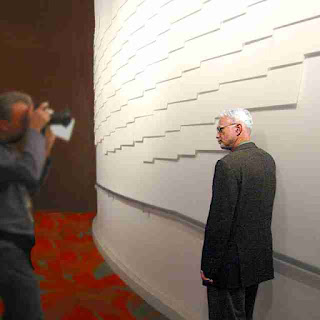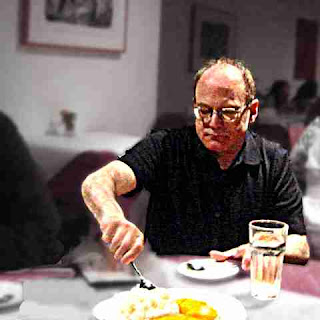It may be as much of a surprise to you as it is to me: I've been reading an actual book: The Third Reich in Power by Richard J. Evans It's the second book of a trilogy and it covers the Nazi dictatorship during peacetime, 1933 until 1939. Evans' prose is a surprisingly easy read.
Under the grander topic of propaganda is a chapter about music. Classical music was considerably more important there in Germany then than it is here in the U.S. now. Richard Strauss, Germany's most famous living composer, became President of the Reich Music Chamber, the organization responsible for unifying the music world according to Nazi ideals. (Here's some background.) Strauss, to his credit, didn't have the cajones to play hardball with the Nazis - but apparently he did have plenty of composerly ego.

Here's a short excerpt from page 203 of the book, ending with a quote from old Richard himself:
Great orchestras continued to perform great music under the baton of great conductors, although the range of music performed, and the number of prominent conductors who directed it, were both smaller than before 1933. Yet many considered that there were no new great composers. Strauss himself took this view. If anything, it even increased his already unshakeable sense of his own importance as the heir of the great tradition of German composers. 'I am the last mountain of a large mountain range, ' he said: 'After me come the flatlands."
JOHN ADAMS
Mixed Meters regulars will know of my relationship with John Adams. Along with allowing me to make a living in music, I get a unique (if somewhat tunnel-vision) look at his scores long before they're performed. I've known him for many years but that doesn't mean we get many chances to talk. So to supplement my from the wings view of THE in-demand living composer, I resort to reading what he says to the media.
Last summer, the premiere of his Doctor Atomic Symphony was broadcast over the Internet by the BBC. Here's a paragraph transcribed from the back announcement (what the announcer said over the applause at the end) :
"Well, I like something John Adams said recently, when he was talking about being a contemporary classical composer in today's American cultures, being pretty much a useless activity even though he's one of the most performed living composers. He says he's off the broad cultural radar in the U.S.A. but that he consoles himself by thinking that Emily Dickinson and Walt Whitman were unappreciated and misunderstood in their lifetime and are now feted as amongst America's greatest cultural treasures. "I guess that's why we call it classical", he added "we're buying long term bonds here." (Andrew MacGregor, BBC announcer.)Recently John has been in Baltimore. The Baltimore Sun website has this article by Tim Smith. John is quoted:
"There are a lot of composers today," Adams said, "just not a lot of original ones. You could count the number of great composers today on half a hand."Later in the article he names names. Of course John's opinions are filtered through the critic's prose. To quibble about words for a bit, I think John might have been telling us who he thinks are the (other) "good" composers these days, those whose music he himself likes. But the quote and the article seem to confuse "originality" and "greatness" two very different things.
Here's a picture of John posing for a publicity photo in Disney Hall during December 2005.

Being "great" means being accepted, even revered, by lots of people over a very long time. These days it means competing with guys like Bach or Beethoven. John is indeed a candidate for inclusion someday. Our culture doesn't allow easy entry into this category. Judging by the recent head counts it's easier to become a Catholic Saint than a truly Great Composer.
On the other hand "originality" means breaking barriers, being unique, unpredictable and unclassifiable. There's a whole spectrum of originality ranging from too much ("eccentric" "weird" or "incomprehensible") to not enough ("derivative" "repetitive" or "old-fashioned"). We demand just the right amount of originality from our contemporary music. We want it to be more original than pop music but not so original that we can't enjoy it at first hearing.
As John's elevation among the mountain range of living composers continues to increase he probably gets asked the "who else" question more and more. The question itself and apparently his recent responses tend to focus peoples attention on fewer and fewer candidates. Too bad about that.
RICHARD EMMET
I met Richard Emmet long ago at the CIA.1 I worked with him both at the ICA 2 and at the ICA 3. Then he showed good sense, moved away from LA to Portland, where he raised a family and is now finding happiness.
Several months ago he visited Southern California for the first time in a long while. Here's a picture of him at a local Thai restaurant attacking a plate of Mango Sticky Rice with great determination.

While he was here we were able to talk a little about the music we've both been writing lately. I promised to send him a disc of my stuff - which I have yet to do. Until then I suggested that he listen to some of my pieces on this very website (over there in the left hand column). Richard's own website, with samples of his music, is available here.
Richard did find a few moments to listen and he wrote about his reactions.
"Well, it took me awhile, but I finally listened to several of your electronic pieces. I don't think I can fully express how impressed I was. Your music is unmistakably unique: it has attitude, humor, amazing variety and tonal coloring, endless surprises and strange juxtapositions, great use of spatial perspective, and whatever this means, it feels like it could only have come from California. It has echoes of Harry Partch and maybe a bit of FZ [Frank Zappa], but it is completely your own. I hope you continue doing this."I was flattered. He agreed to let me publish his comments here. Obviously Richard is a man of rare intelligence and perception. I don't really understand why my music could only come from California. Maybe he'll leave a comment and explain.
Meanwhile, here's a close up of that same plate of Mango Sticky Rice. It was very good; this picture is has the more accurate color.

Cultural Radar Tags: Richard Strauss. . . Richard J. Evans. . . Richard Emmet. . . John Adams. . . contemporary composers. . . great composers. . . original composers. . . California composers. . . Iowa composers
FOOTNOTES:
1 Richard and I met while students at the California Institute of the Arts.
2 Richard and I were both active in the Independent Composers Association.
3 Richard and I were both employees of InterContinental Absurties, Frank Zappa's production company.
3 comments :
I have fond memories of that sticky rice. In fact, it was the best Thai meal I've ever had. But who is that old guy digging into it? You say it's me? Oh geez, the ravages of time. (Although, to be fair, David, if you were to increase the resolution a bit, my face might look slightly less decrepit.)
In any case, I was indeed delighted and inspired to hear your music. And when you told me you generated it via a notation program and not a standard sequencer, I was even more impressed.
Why only from California? I have no real explanation other than that the music conjured images of wide open spaces, desert landscapes, the rich wild tapestry of big-city sprawl, and a zany expressive freedom I've always associated with California. Part of it may be nostalgia for the Los Angeles of my youth, which my first visit in 20 years only fueled.
Richard
Sorry about the picture, Richard - but it turned out to be the only one I took of you while you were here. And it wasn't a terribly great shot either - so I tweaked it in Photoshop. Next visit, I'll take 2 pictures, okay?
The look on your face, however, was entirely your own doing. Maybe I should have added a thought balloon saying "Mom, the sticky rice took my spoon and won't give it back!"
Yeah, 2 pictures should do the trick.
And yes, that rice was putting up quite a fight. But in the end, it had no chance.
Post a Comment